From Lacchmangarh to Tezpur: The Bagaria Family of Assam
Category:
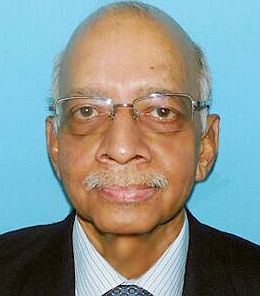
Vijay completed his ISCE in 1966 from St Xavier's, Jaipur. He was actively involved in editing the school paper 'X-Rays', was Troop Leader of the Boy Scouts group, participated in social service activities, etc. He also played a key role in staging of the school play "Dial M for Murder".
Vijay and his wife Shashi have two sons Ashish &\; Gauravh, and 4 grand-children.
The roots in Rajasthan
This story is primarily of my grandfather Kedarmalji Agarwal and his family down the generations. (Agarwal was the popular community title that changed to Bagaria as I have explained later.)
His ancestors belonged to Lacchmangarh in Sikar district of Rajasthan. Kedarmalji's father, my great-grandfather Lakshmi Narayanji, had purchased a small plot of land for farming about six km away from Lacchmangarh. Several people moved to the same location, which eventually came to be known as Bagri village.
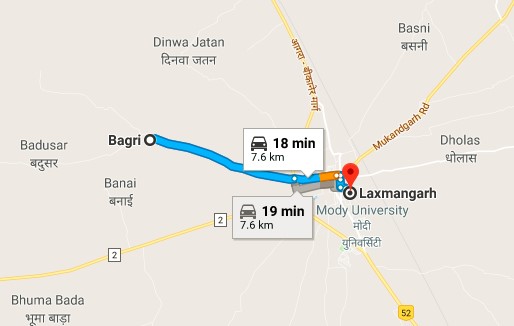
Map showing Bagri. 2018
Later, the family of Lakshmi Narayanji and his son Kedarmalji began to be called Bagriwala, which gradually evolved to Bagaria, our current family name. We are distinct from any group of Bagaria families who originated from Bagar, a village in the Jhunjhunu district of Rajasthan. Somehow, my father and his siblings still continued with the Agarwal name but when we started going to school we were enrolled as Bagaria. This is the name we have been using since then.
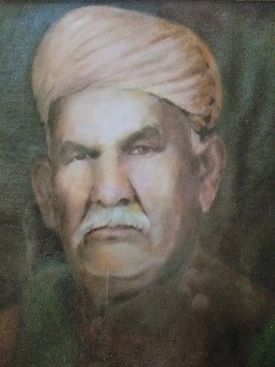
Kedarmal Agarwal (1882-1967)
>\;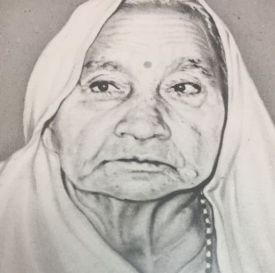
Jaidei Devi, wife of Kedarmal ji
The migration to Assam
Around the beginning of the twentieth century, a number of families from Rajasthan began moving to all parts of the country - lock, stock and barrel. In 1893, my grandfather Kedarmalji, at the age of 11, moved to a small town Tezpur in Assam, a remote corner of the country.
In those days people used to travel the long distances (in this case almost 2000 kms) over a period of 10 days or more, by train or a combination of train (up to Calcutta) and then by steamer up the mighty Brahmaputra river passing through the eastern region of Bengal (which came to be known as East Pakistan after independence in 1947 and is now Bangladesh (after the war of liberation in 1965).
Life &\; Business in Assam
In Tezpur, Kedarmalji joined as an employee of the firm of Ganeshdas Bilasiram dealing in groceries. Later, he bought a small plot of land in Nepalipatty area of Tezpur.
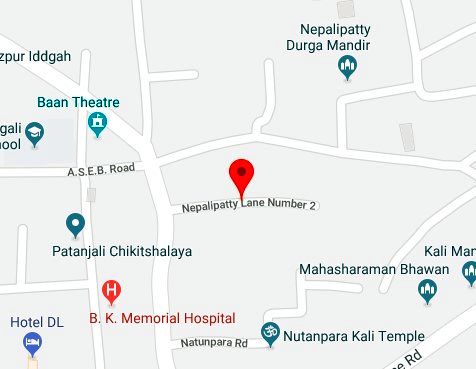
Map Nepalipatty area of Tezpur.2018.
It was virgin forest area where nobody ventured to go and settle. So, Kedarmalji moved there, armed with a Khukri (a Nepali machete) and a Lathi (bamboo pole) to face any eventuality. He had a lantern for minimal lighting. Remember, there was no electricity in those days!
He began the process of developing the land. Gradually, other people moved in to help develop the property. The firm of Ganeshdas Bilasiram moved to this new location, where it stands till this day.
Kedarmalji left service in 1926 and purchased some land from the renowned family of Jyoti Prasadji Agarwalla in the heart of Tezpur. Here he set up his own little grocery store. The firm was named Kedarmal BadriNarayan, as it was customary in those days to name a business entity after a person and his eldest son. At the same time Kedarmalji called his eldest son (my father) Badri Narayanji from Lacchmangarh to Tezpur when the latter was just about 17 years old.
Badri Natayanji had been married to Saraswati Devi, daughter of Kesar Deoji Kedia of Lacchmangarh, when he was only 12 years old.
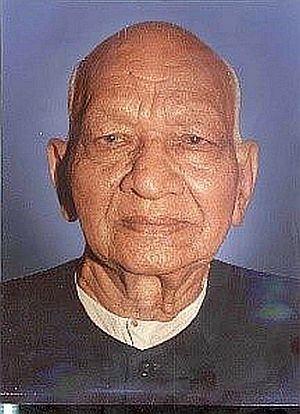
Badri Narayan Agarwal, Author's father. 19th Nov 1909 - 18th Jun 1998

Saraswati Devi. Wife of Badri Narayan ji, Author's mother.
Dwarka Prasadji, the younger brother of BadriNarayanji, also moved to Tezpur at a tender age of 11.
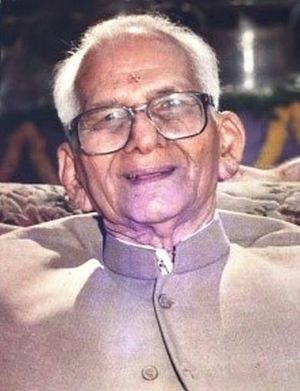
Dwarka Prasad Agarwal. 07 Oct 1915 - 05 Jun 2001
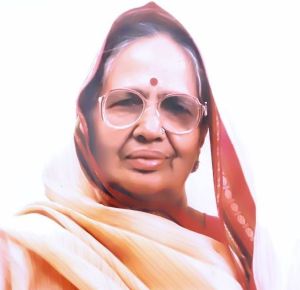
Anandi Devi, wife of Dwarka Prasad ji.
Gauri Shankerji, the youngest son of Kedarmalji, was born in Tezpur in 1927.
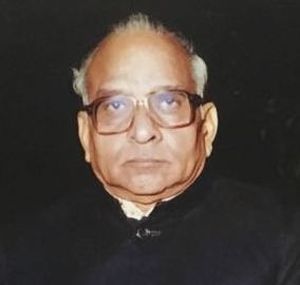
Gauri Shanker Agarwal. 8 Sep 1927 - 20 Jan 2008
>\;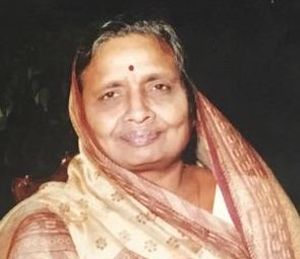
Savitri Devi, wife of Gauri Shankar ji.
Badri Narayanji got his early education in Lacchmangarh itself, walking 6 kms each way daily from Bagri to his school.
Dwarka Prasadji, ever an intelligent and hard-working student, made rapid strides in his academics, getting ‘double-promotion' twice while studying in Tezpur Academy, and completing his matric in 1934 at a relatively young age of 19. Eager to pursue further studies he wanted to move to a larger town Gauhati, Assam but was discouraged to do so by his family.
However, in defiance of his family's wish, he ‘escaped' to Gauhati, where he completed his ‘I. Com' (Intermediate-Commerce). Then, he moved to Calcutta (now Kolkata) and joined as a travelling salesman in Firestone Tyre Co. An extremely successful salesman, he earned substantial amounts by way of salary and commission. This later became the seed capital for the growth of the Bagaria family.
Upon his return to Tezpur, the local people persuaded Dwarka Prasadji to set up a trading business in textiles. Eventually the brothers Badri Narayanji and Dwarka Prasadji established a textile store within the firm of Kedarmal BadriNarayan, which was then re-christened K B Stores. The store has grown manifold with the addition of several more departments, and till today stands testimony to the pioneering efforts of the Bagaria elders.
Badri Narayanji would carry loads of cloth on a bicycle or bullock cart and sell them in nearby villages. He started procuring brass and ivory goods from Jaipur that were quickly picked-up by the British army soldiers. The grocery business, meanwhile, had been discontinued to allow for the growth of textiles and other business that included hardware and building material, glass panes, electricals, furnishings, novelty goods, et al.
This expansion began around the year 1947-48 and the youngest brother Gauri Shankerji played a major role in this development. Several small business enterprises followed such as a soap manufacturing unit, a brick kiln etc.
The three brothers continued to expand the business in Assam.
A bigger opportunity came when the local British tea estate managers urged Dwarka Prasadji to take up repairing of tea machinery which, till then, was imported from England. A small workshop with a drill and welding machine was set up in Tinsukia for undertaking repair jobs.
Steelsworth Limited was incorporated in 1949 which, over the years, grew manifold and was equipped with modern machinery for the manufacture of tea processing machinery as well as fabrication of structures and storage tanks. Factories were set up at Tezpur and Gauhati to cater to the needs of the tea industry all over Assam and Bengal. Dwarka Prasadji, with his educational background and entrepreneurship skills, led the family's growth in business, took care that all the children got the best of education and established the family's role as leaders in the community.
Education for the younger generation
In those days, Assam did not have many schools offering quality education. So, the family looked for suitable schools elsewhere in the country where the children could be sent. Fortunately, the best schools were identified back in Rajasthan itself.
The boys all went to St Xavier's, Jaipur, which was acknowledged as one of the leading educational institutions in the country at that time. Everyone from the eldest Om Prakash Bagaria (completed high school in 1957) down to the youngest Suresh Bagaria were admitted this wonderful institution.
The girls went to study in another popular school in those days, Birla Balika Vidyapeeth in Pilani. Since our parents were in Assam we all became ‘hostellers'.
Epilogue
T &\; I Private Limited, the flagship tea machinery company. In 1975 we had a major family business re-structuring. As part of this change, the Tezpur unit was taken over by the eldest brother Badri Narayanji's family. This factory, originally named "Trade &\; Industry Ltd", continues to flourish till today under the name and style of "T &\; I Private Limited." It is managed by the author Vijay Bagaria and his sons Ashish and Gauravh.
Since 1975, the business has taken giant leaps in the manufacture of tea processing machinery with stress on latest technology and standards of quality. Its products have found wide acceptance in all tea producing markets within India as well as overseas in African countries (Kenya, Uganda, Tanzania, Rwanda, Uganda, Malawi &\; Zimbabwe), Sri Lanka, Bangladesh, Vietnam, China, and even Indonesia and Australia.

Front view of the office of T &\; I Pvt Ltd, Tezpur, Assam. 2018.
The making of men. This was an integral part of the businesses of the Bagaria family. Each establishment came to be known as a ‘training centre' where people came and learnt the trade under the paternal guidance of one of the elders. Some of them later left and became successful businessmen in their own right.
Shanker Rice Mill was established in Tezpur, and Krishna Lal Tibrewal, hitherto working at Ganeshdas Bilasiram, was employed to look after the mill. He brought a boiler and an engine (to be used for generating power) on a boat from a tea garden and installed them in the mill. As his family grew and he had the urge to run his own business, the entire Shanker Rice Mill was handed over to him and it continue to function under the name of Krishna Rice Mill.
Contributions to society. Community welfare has been deeply ingrained in the family ethos since ages. In Bagri village Laxmi Narayanji had sunk a ring-well and built a temple. A water hut was set up to provide cool drinking water to the needy public which was a dire necessity in those days. He would stop passers-by and provide them drinking water with his own hands, feed them "bajra roti" (millet bread) and "chaaj" (butter-milk). Dadaji always considered providing water as the most noble deed of all. Before he died his last message was "do anything but don't close down this water-hut. As long as it continues to function you will remain healthy". The water-hut continues to provide cool drinking water to this day.
Charities and social welfare activities have been endless --- scholarships to the poor and needy students, flood relief in affected areas, free medical aid, eye-treatment camps, a free Ayurvedic hospital in Tezpur, stipend for higher studies and research, etc. are only a few of the notable activities undertaken by the family through charitable trusts established for this purpose.
It is pertinent to mention here the name of Prof Deepak Jain who studied in a small Hindi medium school Rashtrabhasha Vidyalaya in Tezpur but through sheer hard work in academics and supported by the Bagaria family trust in Tezpur, went on to become Dean of the Northwestern University School of Management, Chicago and later the Dean at INSEAD, Paris.
Continuing to work in the old spirit. Our businesses and our families are well-established today, and we strive to grow steadily. Looking back, we salute the pioneering spirit of our elder generation who worked against all odds to lay a strong foundation for the future generations. We are only reaping the benefits of their vision and entrepreneurship skills, rare commodities even in today's competitive world.
© Vijay Bagaria 2018
Comments
Your assam story
Add new comment